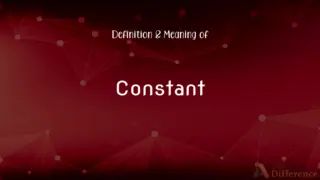Bussed vs. Bused — What's the Difference?
By Tayyaba Rehman — Updated on November 7, 2023
Bussed can mean 'kissed' or 'cleared tables in a restaurant', while bused refers to riding or providing transportation by bus.

Difference Between Bussed and Bused
Table of Contents
ADVERTISEMENT
Key Differences
Bussed can be the past tense of "bus" meaning to clear tables in a restaurant, or as a colloquial term, to kiss. Bused generally means having traveled by bus or provided bus transportation. Both words are used in past tense narrative but have different contexts. Bussed as in clearing tables or a quick kiss is less commonly used than bused, which is widely recognized in the context of bus transportation.
In a dining context, "The waiter bussed the table after guests left," refers to cleaning up. If someone says, "They bussed in front of everyone," it's likely referring to a quick peck. Bused is straightforward: "We bused to school daily." It only relates to bus transport. Despite spelling, pronunciation for both is the same, which can lead to confusion only in written form. In speaking, context clarifies the meaning.
Bussed can also mean having been transported by a special bus service, such as "Students bussed under the desegregation policy," but this usage is less common. Bused is the standard past tense for taking the bus, as in "Many employees bused to the new office location." It's important to choose the word based on context and not interchange them, as the intended action may differ.
Comparison Chart
Definition
Cleared tables or kissed.
Traveled by bus.
Usage Context
Restaurants, casual kissing.
Transportation, especially public buses.
ADVERTISEMENT
Commonality
Less common usage.
Common usage.
Secondary Meaning
Sometimes used for bus transportation.
Not applicable.
Part of Speech
Verb (past tense of bus or colloquial for kiss)
Verb (past tense of bus).
Compare with Definitions
Bussed
Removed dirty dishes
He bussed the tableware promptly.
Bused
Traveled by bus
We bused across the city.
Bussed
Kissed briefly
They bussed goodbye quickly.
Bused
Took a bus as transportation
He bused to work during the subway strike.
Bussed
Cleared a table
She bussed tables at the diner.
Bused
Transported by public bus
Students bused to school every day.
Bussed
Provided with bus transport (less common)
The company bussed its workers during the strike.
Bused
Conveyed by bus service
Tourists were bused to various landmarks.
Bussed
Transported by special bus service
The school bussed athletes to the game.
Bused
A long motor vehicle for carrying passengers, usually along a fixed route.
Bussed
To kiss.
Bused
(Informal) A large or ungainly automobile.
Bussed
To transport in a bus.
Bused
A four-wheeled cart for carrying dishes in a restaurant.
Bussed
To transport (schoolchildren) by bus to schools outside their neighborhoods, especially as a means of achieving racial integration.
Bused
(Electricity) A bus bar.
Bussed
To carry or clear (dishes) in a restaurant.
Bused
(Computers) A parallel circuit that connects the major components of a computer, allowing the transfer of electric impulses from one connected component to any other.
Bussed
To clear dishes from (a table).
Bused
To transport in a bus.
Bussed
To travel in a bus.
Bused
To transport (schoolchildren) by bus to schools outside their neighborhoods, especially as a means of achieving racial integration.
Bussed
To work as a busboy.
Bused
To carry or clear (dishes) in a restaurant.
Bussed
A kiss.
Bused
To clear dishes from (a table).
Bussed
A long motor vehicle for carrying passengers, usually along a fixed route.
Bused
To travel in a bus.
Bussed
(Informal) A large or ungainly automobile.
Bused
To work as a busboy.
Bussed
A four-wheeled cart for carrying dishes in a restaurant.
Bused
Simple past tense and past participle of bus
Bussed
(Electricity) A bus bar.
Bused
Provided bus transportation
The festival bused attendees from the parking area.
Bussed
(Computers) A parallel circuit that connects the major components of a computer, allowing the transfer of electric impulses from one connected component to any other.
Bussed
Simple past tense and past participle of bus
Bussed
Simple past tense and past participle of buss
Common Curiosities
Are "bussed" and "bused" interchangeable?
No, they have different meanings and contexts.
Is "bused" the past tense of taking a bus?
Yes, it refers to having traveled by bus.
Is "bussed" a correct past tense for bus?
Yes, but usually when referring to clearing tables or colloquially for kissing.
Can "bussed" be used for any type of transportation?
It's typically only used for buses, and it's less common than "bused."
Is "bussed" still used for bus transportation?
It's less common but still correct in some dialects or historical texts.
Does "bused" have any non-transportation meanings?
No, it primarily refers to bus transport.
Can "bussed" mean kissed?
Yes, it's a colloquial use.
Should I use "bused" when talking about transportation?
Yes, "bused" is correct for transportation contexts.
How do you pronounce "bussed" and "bused"?
They are pronounced the same.
Which is more commonly used for transportation?
"Bused" is more common for transportation.
Can "bused" refer to clearing tables?
No, that would be "bussed."
Do "bussed" and "bused" have different spellings in British English?
British English typically uses "bussed" for both meanings.
Is it correct to say "The tables were bussed"?
Yes, it means the tables were cleared of dishes.
Is it important to distinguish between "bussed" and "bused" in writing?
Yes, to avoid confusion due to their different meanings.
Will the context always make clear whether "bussed" or "bused" is meant?
Usually, context will clarify, but in writing, the correct spelling is crucial.
Share Your Discovery

Previous Comparison
Occasionally vs. Often
Next Comparison
Giggle vs. SnickerAuthor Spotlight
Written by
Tayyaba RehmanTayyaba Rehman is a distinguished writer, currently serving as a primary contributor to askdifference.com. As a researcher in semantics and etymology, Tayyaba's passion for the complexity of languages and their distinctions has found a perfect home on the platform. Tayyaba delves into the intricacies of language, distinguishing between commonly confused words and phrases, thereby providing clarity for readers worldwide.











































